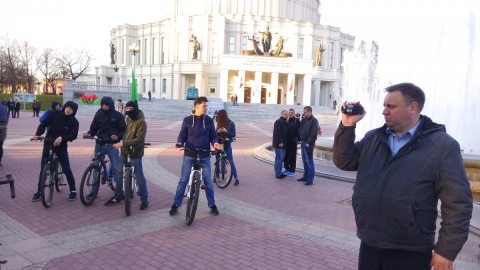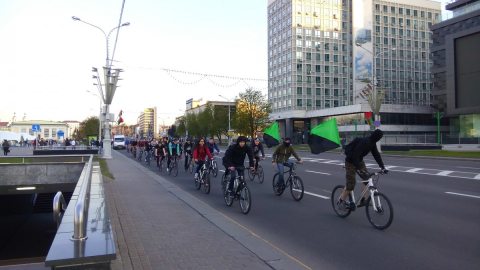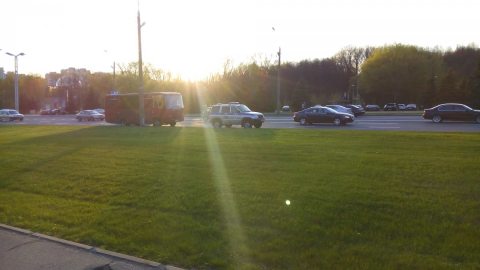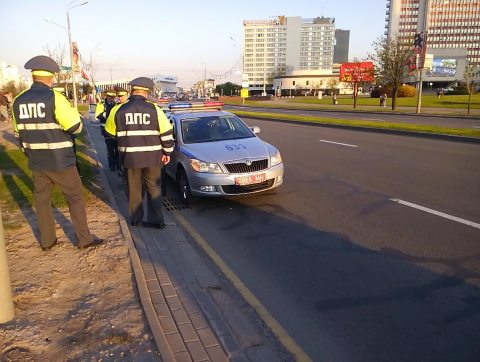Report on monitoring the Critical Mass cycling event on 29 April 2016
A traditional cycling event ‘Critical mass’, taking place on last Friday of every month, was held on 29 April 2016.
Methodology of monitoring
Throughout several years RHRPA Belarusian Helsinki Committee and Human Rights Center ‘Viasna’ have been regularly monitoring mass events in Minsk on the basis of a thoroughly elaborated methodology, which consists of: recruiting and teaching observers principles of civil control, standards of peaceful assembly and methodology of observing; filling in forms during on-site observations, processing of forms and preparing of a monitoring report. Forms of mass events observations have been jointly developed by human rights organisations. They include questions on capability of observation for observers and mass media in relation to the attitude of organisers, mass events participants, police officers and presence of ambulance. Observers may be admitted to observation only by accepting and abiding by rules and principles of the observation (independence and political neutrality; description of facts, not personal opinions, non-interference in the event observed; commitment to the rule of law: rejections of all forms of violence and discriminatory practices; correct behaviour). Whilst executing their duties observers keep separately from participants. Observers are marked by an observer badges and blue jackets.
Preliminary information
Traditionally cycling events are held without submissions of applications. A call for participation and the rules for public order preservation were spread through social networks.
During the mass event on 29 April 2016 1 observer was continuously executing the observation on-site. The observer had been trained accordingly and was marked in a proper way (blue jacket with an observer badge).
І. Observations:
The mass event was of a peaceful character (when ‘organisers have professed peaceful intentions and the conduct of the assembly is non-violent’). Separate incidents between Traffic Police officers and 2 participants should be regarded from the point of view of proportionality of actions of the first ones towards the latter. A full assessment by human rights defenders of the incidents will be issued later, however, at the moment there is no ground for qualification of the assembly as non-peaceful.
Disproportionate physical force was used by the Traffic Police officers and Special Police Force officers during the crackdown of the event. Administrative prosecution of the participants is of a repressive nature and is not connected with a real danger to the preservation of social order.
Participants did not comply with the demand of the Traffic Police officers to leave the traffic area. However, in the context of the realisation of the right to peaceful assembly a given demand is equivalent to the termination of the realisation of the right to freedom of expression.
The right to peaceful assembly and freedom of expression was severely abridged by the violent termination of the mass event.
An arrest of the observer did not have reasonable grounds and can be regarded as arbitrary and contrary to the realisation of human rights protection functions.
ІІ. The course of the mass event
Around 19:00 another mass event was taking place at the meeting point near Theatre of opera and ballet. A big number of cyclists were standing separately from each other along fountains near the Theatre. Approximately 35 participants gathered at the meeting point, 3 of them had their faces hidden and two of them had black-green flags.
At 19:23 the column started its movement through the park towards Yanka Kupala and Maksim Bahdanovich streets. Having crossed the road to green traffic light on the pavement, the participants went on to the road taking the right lane. Upon reaching ‘Niamiga’ metro station, the participants turned to Peramozhcau avenue.
After the column of cyclists passed the Palace of Sport a Traffic Police car was detected. A demand to move to the pavement was announced through the equipment for sound amplification. After the first demand few cyclists went on to the pavement whilst the rest continued on the road.
About 19:34 a Traffic Police car cut one participant up, pressed him down to the pavement. The participant was knocked down to the lawn by the Traffic Police car door being opened. However, the participant got up and quickly ran away, leaving his bicycle behind. Other participants were not allowed to collect his bicycle. At 19:36 the column continued its movement. Upon reaching the crossroads of Peramozhcau and Masherava avenues the column had been moving on the pavement, part of which moved to the road at the crossroads. At that moment (around 19:38) a police (‘militsiya’) car, 2 Traffic Police cars and a red bus were detected.
At 19:40 the cars and the bus stopped, having outdriven and cut several cyclists up. One Traffic Police car cut a driving forwards cyclist up. He lost his balance after the collision with the car and fell down. Traffic Police officers seized him abruptly, whilst others were trying to intervene.
Simultaneously, people wearing civilian clothes jumped out of the bus and seized one of the participants, dragging him on the ground in the direction of the bus. Immediately after them Special Police Force officers appeared to detain several participants and one observer. All detainees were brutally thrown to the ground in the bus, hit several times in faces and bellies. Bicycles were thrown on top of detainees; they were not allowed to get up all the way to the police department. There were no demands from the police officers, no resistance was shown in the bus by the detainees. However, the Special Police Force officers were using brutal force and abusive strong language in relation to them.
ІІІ. Recommendations
To organisers:
*To perform, if possible, preliminary communication with Traffic Police.
To law enforcement representatives:
*Not to use brutal physical and disproportionate force in relation to participants of peaceful assemblies;
* Stop prosecution for participation in peaceful assemblies.
To legislature:
*To initiate amendments to Belarusian legislation to bring it into compliance with international standards of peaceful assemblies.






















